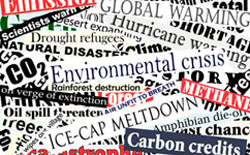Roz Pidcock

Name: Roz Pidcock, PhD, March 2011
What is your current job/who do you work for?
Science Communication Officer for Carbon Brief
What is your background – how did you get to this point in your career?
I started off in research (oceanography) but towards the end of my PhD, I became particularly interested in science communication. I started writing articles for our in-house magazines and newsletters and I did a few short courses and work placements to get some experience in science writing. When I finished my PhD, I got a job as a science writer specialising in environmental policy. Now that I’m with Carbon Brief, I write about climate change – reporting on new research and how climate change issues are covered in the media.
What do you enjoy about your job?
 I love being at the cutting edge of new research, meeting world-leading scientists and reporting on the work they’re doing. Climate change is such an important topic and there’s a huge public appetite to learn more. Unfortunately, because it’s such a political topic, there is a lot of misinformation in the media. I enjoy putting news stories into context and pointing out when research is being spun for political purposes, arming people with the information they need to make informed decisions about what they see and hear. Part of it is trying to improve how climate change is discussed by getting journalists and politicians to back up what they say with evidence. I also enjoy helping scientists to talk about their work, to be part of the discussions and to inspire people to have an interest in science.
I love being at the cutting edge of new research, meeting world-leading scientists and reporting on the work they’re doing. Climate change is such an important topic and there’s a huge public appetite to learn more. Unfortunately, because it’s such a political topic, there is a lot of misinformation in the media. I enjoy putting news stories into context and pointing out when research is being spun for political purposes, arming people with the information they need to make informed decisions about what they see and hear. Part of it is trying to improve how climate change is discussed by getting journalists and politicians to back up what they say with evidence. I also enjoy helping scientists to talk about their work, to be part of the discussions and to inspire people to have an interest in science.
What don’t you enjoy about your job?
There’s always so much to do and not enough time to do it!
What is a typical day like in your work?
 When I get into the office in the morning, I’ll do a really thorough sweep of news sites, social media sites, blogs etc … to see whether climate change is in the news, whether it’s being reported accurately and what people are saying about it. If any major newspaper has misrepresented something (which they do quite often!) we’ll research the topic and write a blog pointing out where the article is wrong and why. I’ll usually contact two or three people for comment so I spend a least a bit of my day talking to scientists about their work. After the blog is published, I might spend the rest of the day reading new scientific papers, researching a particular topic, writing a briefing for someone or looking for new papers that might get media attention over the next few days. My day is mainly dictated by what’s happening in the news – so each day can be different!
When I get into the office in the morning, I’ll do a really thorough sweep of news sites, social media sites, blogs etc … to see whether climate change is in the news, whether it’s being reported accurately and what people are saying about it. If any major newspaper has misrepresented something (which they do quite often!) we’ll research the topic and write a blog pointing out where the article is wrong and why. I’ll usually contact two or three people for comment so I spend a least a bit of my day talking to scientists about their work. After the blog is published, I might spend the rest of the day reading new scientific papers, researching a particular topic, writing a briefing for someone or looking for new papers that might get media attention over the next few days. My day is mainly dictated by what’s happening in the news – so each day can be different!
What are the key skills involved with your line of work?
A very broad mix of research and writing skills. Reading and understanding scientific material; a detailed understanding of a wide range of climate-related topics; writing short, engaging news articles; researching and writing in depth features and investigative pieces; interviewing scientists; building good working relationships with scientists and journalists; keeping abreast of new research; making quick judgments about quality of media coverage; attention to detail in assessing scientific accuracy; working under pressure and to deadlines
What top tips and advice can you offer to other people who may want to follow a similar career path to you?
Just try to get experience in whatever you can. There are a lot of different science communication careers, most of which offer some sort of short placements or work experience. Even if somewhere doesn’t offer formal work experience, ask if you can shadow someone for a week. I found that people are usually willing to help or pass you in to someone who can. Don’t worry that not staying in research means your degree has been wasted, even if it’s a PhD. A high-level science background will always be a huge asset, whatever you choose to do at the end of it.










